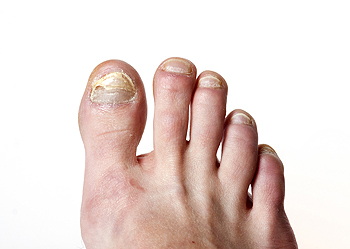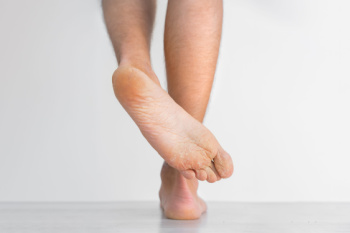Connect With Us
Blog
Items filtered by date: May 2024
Genetics and Congenital Foot Problems

Genetics can play a significant role in the development of congenital foot problems, particularly in pediatric patients. Common deformities such as clubfoot, flat feet, and metatarsus adductus often manifest at birth or during early childhood. Clubfoot is characterized by a twisted foot that points downward and inward, whereas flat feet involve a lack of arch in the foot when standing. Metatarsus adductus presents with the front half of the foot turned inward. These conditions are believed to occur due to a combination of genetic and environmental factors, although the precise causes are still not fully understood. Symptoms typically include abnormal foot shape, difficulty in walking, and discomfort. Treatment options vary from custom orthotics to surgical intervention, depending on severity. Prognosis is generally good with early treatment. If you are a parent and notice signs of foot deformities in your children, it is suggested that you schedule an appointment with a podiatrist for diagnosis and appropriate management.
Congenital foot problems require immediate attention to avoid future complications. If you have any concerns, contact Dr. David Ungar of Personal Foot Care. Our doctor can provide the care you need to keep you pain-free and on your feet.
Congenital foot problems are deformities affecting the feet, toes, and/or ankles that children are born with. Some of these conditions have a genetic cause while others just happen. Some specific foot ailments that children may be born with include clubfeet, polydactyly/macrodactyly, and cleft foot. There are several other foot anomalies that can occur congenitally. What all of these conditions have in common is that a child may experience difficulty walking or performing everyday activities, as well as trouble finding footwear that fits their foot deformity. Some of these conditions are more serious than others. Consulting with a podiatrist as early as possible will help in properly diagnosing a child’s foot condition while getting the necessary treatment underway.
What are Causes of Congenital Foot Problem?
A congenital foot problem is one that happens to a child at birth. These conditions can be caused by a genetic predisposition, developmental or positional abnormalities during gestation, or with no known cause.
What are Symptoms of Congenital Foot Problems?
Symptoms vary by the congenital condition. Symptoms may consist of the following:
- Clubfoot, where tendons are shortened, bones are shaped differently, and the Achilles tendon is tight, causing the foot to point in and down. It is also possible for the soles of the feet to face each other.
- Polydactyly, which usually consists of a nubbin or small lump of tissue without a bone, a toe that is partially formed but has no joints, or an extra toe.
- Vertical talus, where the talus bone forms in the wrong position causing other bones in the foot to line up improperly, the front of the foot to point up, and the bottom of the foot to stiffen, with no arch, and to curve out.
- Tarsal coalition, when there is an abnormal connection of two or more bones in the foot leading to severe, rigid flatfoot.
- Cleft foot, where there are missing toes, a V-shaped cleft, and other anatomical differences.
- Macrodactyly, when the toes are abnormally large due to overgrowth of the underlying bone or soft tissue.
Treatment and Prevention
While there is nothing one can do to prevent congenital foot problems, raising awareness and receiving neonatal screenings are important. Early detection by taking your child to a podiatrist leads to the best outcome possible.
If you have any questions please feel free to contact our office located in Farmington, MI . We offer the newest diagnostic tools and technology to treat your foot and ankle needs.
The Many Causes of Swollen Ankles

Swollen ankles can arise from various factors, ranging from genetics to underlying health conditions. It is important to delve deeper into the potential causes of swollen ankles, because they can signal serious underlying health issues. For instance, obesity, diabetes, infections, and venous insufficiency can lead to fluid retention in the ankles, which makes them become swollen. Other serious conditions that can result in swelling in the ankles include congestive heart failure, deep vein thrombosis, and liver or kidney problems. Pregnancy, medications, insect bites, and sprains can also cause the ankle to swell. Prolonged standing or consuming excess salt are other other factors. Depending on the underlying cause, interventions may include lifestyle modifications, medications, or targeted therapies. If you have noticed that your ankles are swelling abnormally, it is suggested that you schedule an appointment with a podiatrist for an accurate diagnosis and personalized treatment plan.
Ankle pain can be caused by a number of problems and may be potentially serious. If you have ankle pain, consult with Dr. David Ungar from Personal Foot Care. Our doctor will assess your condition and provide you with quality foot and ankle treatment.
Ankle pain is any condition that causes pain in the ankle. Due to the fact that the ankle consists of tendons, muscles, bones, and ligaments, ankle pain can come from a number of different conditions.
Causes
The most common causes of ankle pain include:
- Types of arthritis (rheumatoid, osteoarthritis, and gout)
- Ankle sprains
- Broken ankles
- Achilles tendonitis
- Achilles tendon rupture
- Stress fractures
- Bursitis
- Tarsal tunnel syndrome
- Plantar fasciitis
Symptoms
Symptoms of ankle injury vary based upon the condition. Pain may include general pain and discomfort, swelling, aching, redness, bruising, burning or stabbing sensations, and/or loss of sensation.
Diagnosis
Due to the wide variety of potential causes of ankle pain, podiatrists will utilize a number of different methods to properly diagnose ankle pain. This can include asking for personal and family medical histories and of any recent injuries. Further diagnosis may include sensation tests, a physical examination, and potentially x-rays or other imaging tests.
Treatment
Just as the range of causes varies widely, so do treatments. Some more common treatments are rest, ice packs, keeping pressure off the foot, orthotics and braces, medication for inflammation and pain, and surgery.
If you have any questions please feel free to contact our office located in Farmington, MI . We offer the newest diagnostic tools and technology to treat your foot and ankle needs.
Symptoms of Toenail Fungus
 Toenail fungus, also known as onychomycosis, has several distinct symptoms that can affect the appearance and health of your toenails. The infection usually starts with a white or yellow spot under the tip of the toenail. As it progresses, the fungus can cause the nail to discolor, thicken, and develop crumbling edges. This may make the nail difficult to trim. The affected nails may also become brittle, ragged, and take on a dull, lackluster appearance. In some cases, the nail can separate from the nail bed. This may be a painful experience and can lead to further complications. Advanced cases of toenail fungus can result in a foul odor. A podiatrist, or foot doctor, can recommend effective treatments. These often include antifungal medications, topical treatments, and, in severe instances, professional removal of the nail. If you suspect toenail fungus, it is suggested that you schedule an appointment with a podiatrist to discuss treatment options.
Toenail fungus, also known as onychomycosis, has several distinct symptoms that can affect the appearance and health of your toenails. The infection usually starts with a white or yellow spot under the tip of the toenail. As it progresses, the fungus can cause the nail to discolor, thicken, and develop crumbling edges. This may make the nail difficult to trim. The affected nails may also become brittle, ragged, and take on a dull, lackluster appearance. In some cases, the nail can separate from the nail bed. This may be a painful experience and can lead to further complications. Advanced cases of toenail fungus can result in a foul odor. A podiatrist, or foot doctor, can recommend effective treatments. These often include antifungal medications, topical treatments, and, in severe instances, professional removal of the nail. If you suspect toenail fungus, it is suggested that you schedule an appointment with a podiatrist to discuss treatment options.
If left untreated, toenail fungus may spread to other toenails, skin, or even fingernails. If you suspect you have toenail fungus it is important to seek treatment right away. For more information about treatment, contact Dr. David Ungar of Personal Foot Care. Our doctor can provide the care you need to keep you pain-free and on your feet.
Symptoms
- Warped or oddly shaped nails
- Yellowish nails
- Loose/separated nail
- Buildup of bits and pieces of nail fragments under the nail
- Brittle, broken, thickened nail
Treatment
If self-care strategies and over-the-counter medications does not help your fungus, your podiatrist may give you a prescription drug instead. Even if you find relief from your toenail fungus symptoms, you may experience a repeat infection in the future.
Prevention
In order to prevent getting toenail fungus in the future, you should always make sure to wash your feet with soap and water. After washing, it is important to dry your feet thoroughly especially in between the toes. When trimming your toenails, be sure to trim straight across instead of in a rounded shape. It is crucial not to cover up discolored nails with nail polish because that will prevent your nail from being able to “breathe”.
In some cases, surgical procedure may be needed to remove the toenail fungus. Consult with your podiatrist about the best treatment options for your case of toenail fungus.
If you have any questions please contact our office located in Farmington, MI . We offer the newest diagnostic and treatment technologies for all your foot and ankle needs.
Why Live with Pain and Numbness in Your Feet?
Treatment for Athlete’s Foot
 Athlete's foot is a fungal infection that thrives in moist, warm environments. This makes it common for people who wear tight, sweaty shoes for extended periods or use communal showers and locker rooms. The fungus infects the skin in the toes and causes itching, burning, and peeling. A podiatrist, or foot doctor, may suggest antifungal medications to apply topically, usually for a couple of weeks until the infection clears up. For more severe cases, oral antifungal medications may be prescribed. Preventative measures include keeping the feet clean and dry, changing socks regularly, and wearing well-ventilated shoes. Antifungal powders for shoes and socks may also be suggested as prevention. In addition, avoiding barefoot walking in public areas and using separate towels for your feet can help prevent the spread and recurrence of athlete's foot. If you suspect an athlete’s foot, it is suggested that you make an appointment with a podiatrist for relief.
Athlete's foot is a fungal infection that thrives in moist, warm environments. This makes it common for people who wear tight, sweaty shoes for extended periods or use communal showers and locker rooms. The fungus infects the skin in the toes and causes itching, burning, and peeling. A podiatrist, or foot doctor, may suggest antifungal medications to apply topically, usually for a couple of weeks until the infection clears up. For more severe cases, oral antifungal medications may be prescribed. Preventative measures include keeping the feet clean and dry, changing socks regularly, and wearing well-ventilated shoes. Antifungal powders for shoes and socks may also be suggested as prevention. In addition, avoiding barefoot walking in public areas and using separate towels for your feet can help prevent the spread and recurrence of athlete's foot. If you suspect an athlete’s foot, it is suggested that you make an appointment with a podiatrist for relief.
Athlete’s Foot
Athlete’s foot is often an uncomfortable condition to experience. Thankfully, podiatrists specialize in treating athlete’s foot and offer the best treatment options. If you have any questions about athlete’s foot, consult with Dr. David Ungar from Personal Foot Care. Our doctor will assess your condition and provide you with quality treatment.
What Is Athlete’s Foot?
Tinea pedis, more commonly known as athlete’s foot, is a non-serious and common fungal infection of the foot. Athlete’s foot is contagious and can be contracted by touching someone who has it or infected surfaces. The most common places contaminated by it are public showers, locker rooms, and swimming pools. Once contracted, it grows on feet that are left inside moist, dark, and warm shoes and socks.
Prevention
The most effective ways to prevent athlete’s foot include:
- Thoroughly washing and drying feet
- Avoid going barefoot in locker rooms and public showers
- Using shower shoes in public showers
- Wearing socks that allow the feet to breathe
- Changing socks and shoes frequently if you sweat a lot
Symptoms
Athlete’s foot initially occurs as a rash between the toes. However, if left undiagnosed, it can spread to the sides and bottom of the feet, toenails, and if touched by hand, the hands themselves. Symptoms include:
- Redness
- Burning
- Itching
- Scaly and peeling skin
Diagnosis and Treatment
Diagnosis is quick and easy. Skin samples will be taken and either viewed under a microscope or sent to a lab for testing. Sometimes, a podiatrist can diagnose it based on simply looking at it. Once confirmed, treatment options include oral and topical antifungal medications.
If you have any questions, please feel free to contact our office located in Farmington, MI . We offer the newest diagnostic and treatment technologies for all your foot care needs.


